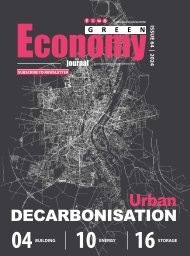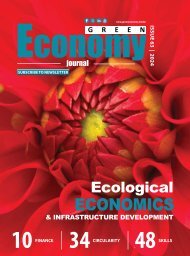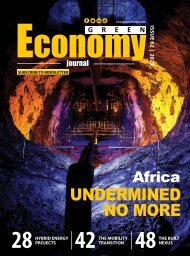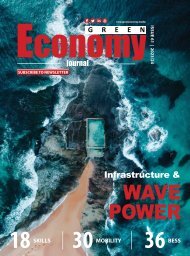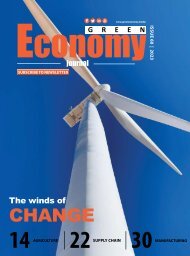Green Economy Journal Issue 39
You also want an ePaper? Increase the reach of your titles
YUMPU automatically turns print PDFs into web optimized ePapers that Google loves.
INFRASTRUCTURE
Decoupling growth
from environmental harm
BY GRAHAME CRUICKSHANKS, GBCSA
It has been said that South Africa is unable to help reduce global warming and that it would
be economically unfeasible. But the potential implications of having this mindset are so huge
that doing nothing would be a serious mistake.
Even though we are behind the northern European countries, we
must remember that they have had the opportunity to plan for
longer, have already completed their industrialisation, and are on
a different economic cycle to us. This is no reason why we should not
implement SA’s well-documented climate change commitments.
South Africa has a long-term dependency on fossil fuels, and these are
declining in their ability to deliver. Our economic downturn is suppressing
energy demand, but the nation is still increasing its carbon emissions
every year. What South Africa needs to link itself to is a peak-plateaudecline
trajectory and we haven’t initiated the plateau yet.
By weaning itself off fossil fuels, South Africa’s economy will liberate
itself. We have one of the best solar climates in the world. And so we need
to see a ramp-up of large-, medium- and small-scale renewable energy
systems coming online.
And the single step of implementing feed-in tariff and net metering
systems will encourage this meaningful crowd-sourced participation of
the private sector. This will unlock the capacity of PV installations of all
sizes by having them feed in any extra electricity generated into the grid,
he explains.
It will greatly assist in implementing our national commitments
towards helping to keep the global warming range below 2˚C above preindustrial
levels. This average rate of temperature change will determine
the likelihood of South Africa’s future ability to compete in the global
economy as an increase of 2˚C translates up to 4˚C for South Africa by the
end of the century.
Prevention is better – and far cheaper than cure – and so separating South
Africa’s carbon footprint from electricity generation and implementing
other effective mitigation measures will reduce South Africa’s inevitable
What South Africa needs to link itself to
is a peak-plateau-decline trajectory and
we haven’t initiated the plateau yet.
environmental impact and so make it easier to adapt to a climate that is not
as hot, dry or erratic.
Eskom is separating out its three functions – the generation, distribution
and transmission of electricity – into different companies. Transparent
processes and management protocols will be required to allow other
power generators to share transmission infrastructure and create healthy
competition required to drive down the price of electricity.
Beyond guarding against the day of insolvency or technical failure at
Eskom that threatens to cripple the country, civil action organisation,
OUTA, rightly points out that these measures will significantly contribute
towards limiting price increases, avoiding rolling blackouts and allow
municipalities to buy directly from independent power producers.
Effective competition to generate and supply electricity will accelerate
the decoupling of South Africa’s economic growth from harmful
environmental impacts. And this may well usher in a plateau period
of carbon emissions, followed by a decline, and all the while a clean,
cheap supply of electricity will lower the cost of doing business and fuel
economic growth and job creation. The GBCSA represents South Africa’s
green building sector and is on hand to assist all stakeholders to transition
towards a sustainable operating environment.
*Grahame Cruickshanks is the managing executive: market engagement at the
Green Building Council of South Africa.
Green Economy Journal - GreenEconomyOnline
greeneconomy.media
15




